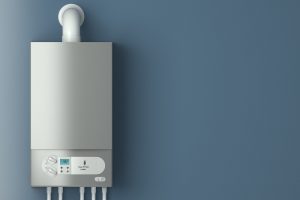 There are a lot of water heater types on the market today, which can be both a blessing and a curse. It’s great that you have so many different ways to possibly provide hot water to your home. Not every home is going to get the most out of every water heater type, though. There are definitely certain water heater types that are going to be more helpful to you than others. If you’re not sure what water heater type will fit your needs best, we recommend reaching out to a contractor you trust to go over your home in-person with you. After an evaluation, they’ll be able to offer some good advice on picking the best water heater type for your needs. In the meantime, though, you should take a look below for some initial tips.
There are a lot of water heater types on the market today, which can be both a blessing and a curse. It’s great that you have so many different ways to possibly provide hot water to your home. Not every home is going to get the most out of every water heater type, though. There are definitely certain water heater types that are going to be more helpful to you than others. If you’re not sure what water heater type will fit your needs best, we recommend reaching out to a contractor you trust to go over your home in-person with you. After an evaluation, they’ll be able to offer some good advice on picking the best water heater type for your needs. In the meantime, though, you should take a look below for some initial tips.
Traditional Tank Water Heaters: Features and Suitability
Tank water heaters are by far the most common type of water heater on the market today. They’re so common that when you think of a water heater, we’re willing to bet that the image in your head is of the storage tank variety. Tank water heaters, as you might guess, store large amounts of water in storage tanks. They heat this supply of water day and night, so that hot water is always available when required. This is very convenient, of course, and it’s the primary reason why people still use them. However, it does have its drawbacks. If you’re considering other options, it helps to know what to expect from tankless systems
Tank water heaters waste a lot of energy on an annual basis heating water that isn’t actually getting used. Sure, it’s convenient, but you’re paying for that convenience. Depending on how much water you want on-hand at all times, you’re also going to have to dedicate more space in your home to accommodate that large storage tank.
Tankless Water Heaters: Efficiency and Use Cases
Tankless water heaters are a more recent water heater type, and are an attempt to answer for some of the shortcomings of tank water heater types. A tankless water heater does not use a storage tank, but instead relies on a heat exchanger similar to the kind you’d find in boiler systems. When there is a need for water, the system will heat water as it flows through it on its way to the faucet. When the need subsides, the system returns to standby mode. This saves energy year over year, compared to tank water heaters. However, there is a slight delay between turning on a hot water faucet and getting actual hot water when using a tankless water heater. Be aware that tankless systems have potential issues, especially under heavy demand or in certain conditions.
So, if you’re looking for a new water heater for your home, those are a couple of the types you have available to you. Talk to a professional about which one would best suit your unique plumbing situation. If you live in an area with mineral-heavy water, keep in mind that hard water may cause more repairs for tankless systems over time.
Frequently Asked Questions
Question: What are the two main types of water heaters homeowners commonly choose from?
Answer: The two most common types are tank (storage) water heaters, which keep water heated and ready in a large reservoir, and tankless water heaters, which heat water on demand as it flows through the system.
Question: What is a key advantage of tank water heaters?
Answer: Tank water heaters offer the convenience of having hot water instantly available whenever needed, which many homeowners appreciate for their everyday usage scenarios.
Question: What is a major drawback of tank water heaters?
Answer: A significant downside is energy waste, as they continuously heat stored water that may not be used, in addition to requiring considerable installation space.
Question: How do tankless water heaters save energy compared to tank units?
Answer: Tankless models only heat water when it’s requested, so there is no standby energy loss from keeping a reservoir hot when it’s not needed.
Question: What is a common limitation of tankless water heaters related to hot water availability?
Answer: There can be a slight delay in receiving hot water when you turn on the faucet, because the system needs time to heat water as it begins to flow.
